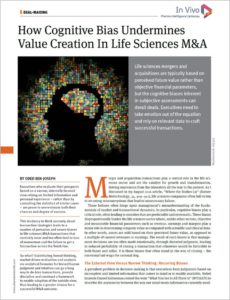How Cognitive Bias Undermines Value Creation in Life Sciences M&A
Life Sciences mergers and acquisitions are typically based on perceived future value rather than objective financial parameters.
How Cognitive Bias Undermines Value Creation in Life Sciences M&A
Published in In Vivo, September 2017
Author: Oded Ben-Joseph, Ph.D.
Life Sciences mergers and acquisitions are typically based on perceived future value rather than objective financial parameters, but the cognitive biases inherent in subjective assessments can derail deals. Executives need to take emotion out of the equation and rely on relevant data to craft successful transactions.
Mergers and acquisition transactions play a central role in the life sciences sector and are the catalyst for growth and transformation, driving innovation from the laboratory all the way to the patient. Life sciences companies often fall victim to recurring misconceptions that lead to unnecessary failure.
News
A Panic Letter and the Quiet Reset of American Biotech
This article examines the quiet but profound reset underway in U.S. biotech, triggered by a rare combination of forces: delayed or reduced federal funding, large pharma cutting mid-stage partnerships, and venture capital pulling back as exits evaporate. Based on insights from Dr. Stanislav Glezer, it reveals a market splitting in two — with capital chasing late-stage and very early assets while Phase 1–2 companies are stranded in the middle. The piece also exposes how government uncertainty, shrinking NIH support, and overlooked patient-behavior realities are forcing founders to rethink their entire company lifecycle. In today’s environment, survival requires new strategies, new geographies, and a deeper understanding of human factors that no protocol can fix.
Read MoreResources

Outcome Capital Life Science Market Pulse
Outcome Capital Life Science Market Pulse November 2025 Click to view our LifeSciences Pulse Newsletter
DownloadContact Us for More Information
Would you like to learn more about working with Outcome Capital or discuss your specific needs?



